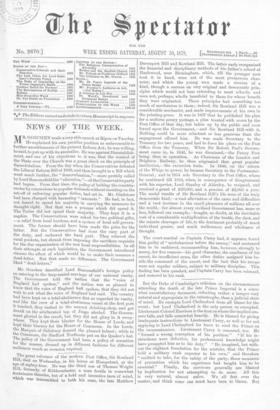NEWS OF THE WEEK • M R. GO SCHEN made every
able speech at Ripon on Tuesday. He explained his own peculiar position as unfavourable to further unsettlements of the present Reform Act; he was willing, he said, to put up with its anomalies. He was against Disestablish- meat, and one of his objections to it was, that the control of the State over the Church was a great check on the principle of Sacerdotalism. From the day when the Conservatives defeated the Liberal Reform Bill of 1866, and then brought in a Bill which went much further, the "demoralisation,"—more prettily called by Lord Beaconsfield the "education,"—of the Conservative party had begun. From that time, the policy of bribing the constitu- encies by concessions to popular demands without insisting on the set-off of enforcing popular duties, had set in. Mr. Gladstone had boon charged with harassing "interests." He had, in fact, not feared to spend his majority in carrying the measures he thought right. But that was a process which did spend it. The Tories did not spend their majority. They kept it in a napkin. The Conservatives were asked for two political gifts, —a relief from local burdens, and a system of local self-govern- ment. The former should have been made the price for the latter. But the Conservatives had done the easy part of the duty, and eschewed the bard part. They relieved the rural pockets, but shrank from imposing the sacrifices requisite for the due organisation of the new local responsibilities, In all their attempts at such legislation, the Government introduced clauses the effect of which would be to make their measure a dead-letter. But that made no difference. The Government liked " dead-letters."






























